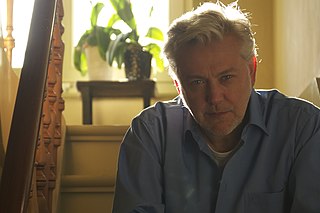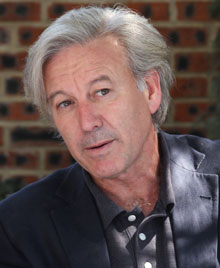Related Research Articles

Aleatoricmusic is music in which some element of the composition is left to chance, and/or some primary element of a composed work's realization is left to the determination of its performer(s). The term is most often associated with procedures in which the chance element involves a relatively limited number of possibilities.

Iannis Xenakis was a Greek-French composer, music theorist, architect, performance director and engineer. After 1947, he fled Greece, becoming a naturalized citizen of France. He is considered an important post-World War II composer whose works helped revolutionize 20th-century classical music. Xenakis pioneered the use of mathematical models in music such as applications of set theory, stochastic processes and game theory and was also an important influence on the development of electronic and computer music. He integrated music with architecture, designing music for pre-existing spaces, and designing spaces to be integrated with specific music compositions and performances.
Curtis Roads is a composer, author and computer programmer. He composes electronic and electroacoustic music, specializing in granular and pulsar synthesis.

Michel Tabachnik is a Swiss conductor and composer.
The Xenakis Ensemble is a Dutch ensemble dedicated to the performance of contemporary classical music. Based in Middelburg, it is known as one of the few ensembles specializing in the works of the composer Iannis Xenakis. It is frequently conducted by Diego Masson, who conducted the performances of many of Xenakis's works, as well as other guest conductors including Huub Kerstens. Its concertmaster is Mifune Tsuji.

Wim Henderickx[wɪm ˈɦɛndərɪks] is a Belgian composer of Contemporary classical music based in Antwerp.

Zbigniew Karkowski was a Polish experimental musician and composer.

Angel Gil-Ordóñez is a Spanish-born American conductor who co-founded the PostClassical Ensemble with music historian Joseph Horowitz and serves as its Music Director. He is also the Principal Guest Conductor of New York’s Perspectives Ensemble and the Music Director of the Georgetown University Orchestra in Washington, D.C. Additionally, he serves as advisor for education and programming for Trinitate Philharmonia, a program in Mexico modeled on Venezuela’s El Sistema, and is also a regular guest conductor at the Bowdoin International Music Festival in Maine.
Walter Hekster was a Dutch composer, clarinetist and conductor of classical music, specializing in contemporary classical music.
James Brody was an American composer, born in Clearfield, Pennsylvania. Frank J. Oteri of the American Music Center's New Music Box called Brody "an important figure in the development of electronic music in the Midwest".

Formalized Music: Thought and Mathematics in Composition is a book by Greek composer, architect, and engineer Iannis Xenakis in which he explains his motivation, philosophy, and technique for composing music with stochastic mathematical functions. It was published in Paris in 1963 as Musiques formelles: nouveaux principes formels de composition musicale as a special double issue of La Revue musicale and republished in an expanded edition in 1981 in Paris by Stock Musique. It was later translated into English with three added chapters and published in 1971 by Indiana University Press, republished in 1992 by Pendragon Press with a second edition published in 2001, also by Pendragon. The book contains the complete FORTRAN program code for one of Xenakis's early computer music composition programs GENDY. It has been described as a groundbreaking work.
Herma is a piece for solo piano composed by Iannis Xenakis in 1961. It is based on a formulation of the algebraic equations of Boolean algebra, and is also an example of what Xenakis called symbolic music.
Scott Wilson is a Canadian composer. He studied music and composition in Canada, the U.S., and Germany, and his teachers include Barry Truax, Wolfgang Rihm, Christos Hatzis, Gary Kulesha, Ron Kuivila, Alvin Lucier, Owen Underhill, Neely Bruce and David Gordon Duke. Since 2004 he has lived in Birmingham, UK, where he is Reader in Electronic Music and Director of Birmingham ElectroAcoustic Sound Theatre and the Electroacoustic Studios at the University of Birmingham.
Kraanerg is a composition for 23 instruments and 4-channel analog tape composed by Iannis Xenakis, originally for a ballet with choreography by Roland Petit and set design by Victor Vasarely. It was created for the grand opening of the Canadian National Arts Centre in Ottawa, which was originally to coincide with Expo 67 but was delayed to 1969.
The Institute of Sonology is an education and research center for electronic music and computer music based at the Royal Conservatoire of The Hague in the Netherlands.
Stefano Scodanibbio was an Italian musician who reached international prominence as a double bassist and composer.
Eric Lamb is an American flutist and Altus performing artist who performs and teaches across the United States and Europe.

Komboï is a 1981 stochastic composition for amplified harpsichord and percussion by Greek composer Iannis Xenakis. It is one of the two compositions for harpsichord and percussion written by Xenakis, the other one being Oophaa.

Aroura is a composition for strings by Greek/French composer Iannis Xenakis. It was composed in 1971.

Miguel Salmon Del Real is a Mexican orchestra conductor, son of an industrial engineer and a psychologist who studied young piano and singing respectively.
References
- ↑ "University of Birmingham. BEAST. Research. Sergio Luque - Stochastic Synthesis". Archived from the original on March 31, 2014. Retrieved 2014-10-05.
- ↑ "Institute of Sonology. Masters Alumni". Archived from the original on 2014-03-31. Retrieved 2012-05-16.
- "Sergio Luque. Bio" . Retrieved 2012-05-16.
- "BCMG INSIGHT: Focus on composer Sergio Luque". Archived from the original on 2011-07-16. Retrieved 2009-02-08.
- Correa, Sergio (2007-03-27). "BBC Mundo. Cultura y Sociedad. Nuevos instrumentos para música nueva". BBC News. Retrieved 2008-01-26.
- "LAC2007 - 5th International Linux Audio Conference". Archived from the original on 2008-01-19. Retrieved 2008-01-26.
- "Visiones Sonoras con nuevos creadores - El Universal - Cultura" . Retrieved 2008-01-26.